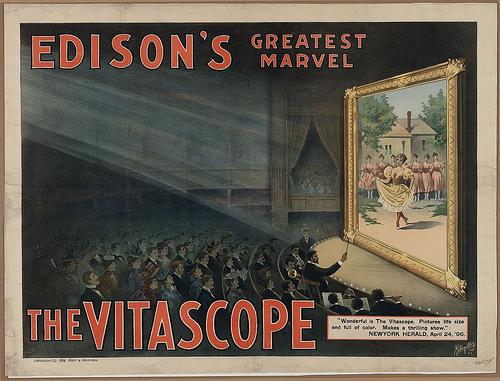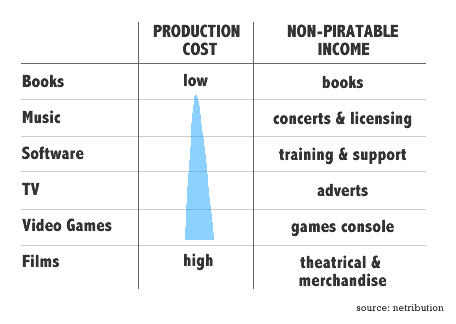As crunch and piracy hits indies, micro-presales, crowd-sourcing and other options
 An article in the LA Times features news of a crowdsourced / micro-presales success story:
An article in the LA Times features news of a crowdsourced / micro-presales success story:
Actress-writer-producer Sybil Temtchine has raised about half of the $600,000 budget for her film "Audrey" from female business leaders. About a year ago, she sat in a Borders and collected the name of every famous female author who'd written a book that somehow touched on female empowerment, from Suze Orman to Marianne Williamson. She wrote to 200 of them, and sent a link to her short film "Piece A' Cake," which was the launching point for her proposed feature, a comedy about female insecurity.
About 75% of the women wrote back. Some sent checks and others introduced her to women's organizations like 85 Broads, which support women entrepreneurs. 85 Broads' founder Janet Hanson "blogged about us. It was the greatest blog, like only a mother would write," Temtchine says. An actress who has appeared in TV shows and films, Temtchine intends to play the lead and opted not to fill out the ensemble cast with name actors because that's a process that can take years. "I felt that this was a hard route, but no harder than waiting around for 10 years," she says.
A rare success story amidst many gloomier tales as indies deal with the quadruple punch of the credit collapse taking out gap finance and private equity, the shutdown of the studio specialty divisions, the collapse of pre-sales amid uncertainty around online rights, and stagnating DVD sales with increasing piracy. For an example of quite how much piracy impacts every level of the industry, not just just studio blockbusters whose income is guaranteed, Chris Jones' latest update on his ever-fascinating blog and video diary is revealing:
One other sign of the time also took place at Memorabilia. A guy I was speaking to said that he had Urban Ghost Story and really liked it. I asked which DVD release it was, and he said, neither, he had downloaded it illegally. Just plain came out and said it. I suggested he could now own his own legal copy and he seemed a little ‘stunned’ that I would be so direct with him. I didn’t push it.
We all know piracy is going on, at an incredible scale too, but to own up to the film maker that they downloaded their film, and then be surprised when the film maker gently suggests they should buy a legal copy tells us a great deal about the state of things. People really do expect music and movies to be free.
For (gulp) advertiser- and sponsor- financed films (see storybid - a new site specifically for this), as well as crowd-sourced films where the micro-funders all have an active interest in seeing the film viewed widely (ie for a campaigning documentary), not to mention films intended primarily to boost the careers of those involved; free, un-restricted file-sharing makes a lot of sense. The advantages of filesharing purely as cheap marketing is still open for debate. For those trying to produce their film so that can recoup its investment, yet who don't want to make a 90 minute Eurostar commercial, the options are currently stark.

As those who know anything about the film industry will realise - for independent, non-studio, non-mainstream films, income from theatrical and merchandise is virtually non-existant. A small independently written, published and distributed book can just about make it's author a living, while a band such as Radiohead can apparently make 70% of their income from touring. The same cannot currently be said for features - ie the non-piratable / non-digital revenues are tiny, while the cost of production is generally very high. To confound it all even further, to get a film on iTunes, the main digital store, at present seems very difficult.
Watching the fascinating Revolution or Reform debate between the Swedes behind the Pirate Bay and Pirate Party and John Buckman, whose Magnatune record label is pioneering the business use of Creative Commons distribution (and has just started a pay-what-you-want subscription service), my overwhelming sense was how films are more expensive to make than music - that a future where the only films made with a budget are studio blockbusters and sponsor-financed is neither culturally exciting nor a step forward:
{google}3700025533865609299{/google}
Of course, much of the file-sharing movement is linked to the open-source world, where GPL-licensed free software competes with the biggies (ie OpenOffice vs Microsoft Office, Ubuntu vs Linux, Gimp vs Photoshop) but people still make donations and pay small independent developers for useful little applications. All these files could easily be pirated but people pay enough to give many of these developers a regular income (ie Joomla than runs Netribution is free, but the comments module at the bottom of this page, and the community manager program are both things I paid for).
But it seems impossible to know just yet if that will be enough - so far the only serious business model I know in this space is Jamie 'Steal this Movie' King's Vodo system, which he is developing with British Documentary Foundation. It's an admirable attempt at a long overdue concept - to encourage file-sharers to make donations while watching pirated content, tho at first glance appears beset by classic old-business double-think: in order to have a proprietary business model it involves a unique piece of software which users must download and install in order to track and identify pirated works being watch (so as to offer a link to make a payment/donation). Nevertheless, the initial test run of the system, on six of the main torrent trackers, should provide great research as to how open file-sharers are to paying by donation - which could be enough to get industry support for a non-profit web wide 'tip-jar' as a kind of user-driven collecting society.
Another option, of course, is to make more money out of physical screenings. At Netribution we've just started a research and development project, backed by the Technology Strategy Board, about how exhibition is changing and how independent artists can benefit from this - which I hope to be writing with more details of soon.